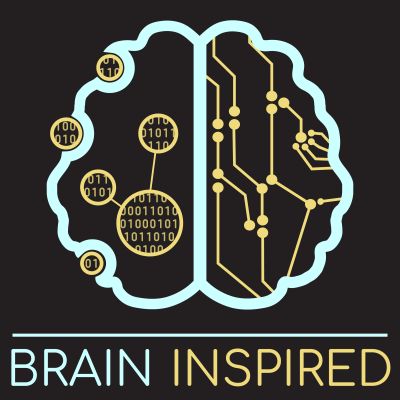Neuroscience and artificial intelligence work better together. Brain inspired is a celebration and exploration of the ideas driving our progress to understand intelligence. I interview experts about their work at the interface of neuroscience, artificial intelligence, cognitive science, philosophy, psychology, and more: the symbiosis of these overlapping fields, how they inform each other, where they differ, what the past brought us, and what the future brings. Topics include computational neuroscience, supervised machine learning, unsupervised learning, reinforcement learning, deep learning, convolutional and recurrent neural networks, decision-making science, AI agents, backpropagation, credit assignment, neuroengineering, neuromorphics, emergence, philosophy of mind, consciousness, general AI, spiking neural networks, data science, and a lot more. The podcast is not produced for a general audience. Instead, it aims to educate, challenge, inspire, and hopefully entertain those interested in learning more about neuroscience and AI.
https://braininspired.co/series/brain-inspired/
Gesamtlänge aller Episoden: 8 days 17 hours 30 minutes
BI 099 Hakwan Lau and Steve Fleming: Neuro-AI Consciousness
Hakwan, Steve, and I discuss many issues around the scientific study of consciousness. Steve and Hakwan focus on higher order theories (HOTs) of consciousness, related to metacognition. So we discuss HOTs in particular and their relation to other approac
BI 098 Brian Christian: The Alignment Problem
Brian and I discuss a range of topics related to his latest book, The Alignment Problem: Machine Learning and Human Values. The alignment problem asks how we can build AI that does what we want it to do, as opposed to building AI that will compromise our
BI 097 Omri Barak and David Sussillo: Dynamics and Structure
Omri, David and I discuss using recurrent neural network models (RNNs) to understand brains and brain function. Omri and David both use dynamical systems theory (DST) to describe how RNNs solve tasks, and to compare the dynamical stucture/landscape/skele
BI 096 Keisuke Fukuda and Josh Cosman: Forking Paths
K, Josh, and I were postdocs together in Jeff Schalls and Geoff Woodmans labs. K and Josh had backgrounds in psychology and were getting their first experience with neurophysiology, recording single neuron activity in awake behaving primates. This episod
BI 095 Chris Summerfield and Sam Gershman: Neuro for AI?
Its generally agreed machine learning and AI provide neuroscience with tools for analysis and theoretical principles to test in brains, but there is less agreement about what neuroscience can provide AI. Should computer scientists and engineers care abou
BI 094 Alison Gopnik: Child-Inspired AI
Alison and I discuss her work to accelerate learning and thus improve AI by studying how children learn, as Alan Turing suggested in his famous 1950 paper. The ways children learn are via imitation, by learning abstract causal models, and active learning
BI 093 Dileep George: Inference in Brain Microcircuits
Dileep and I discuss his theoretical account of how the thalamus and cortex work together to implement visual inference. We talked previously about his Recursive Cortical Network (RCN) approach to visual inference, which is a probabilistic graph model th
BI 092 Russ Poldrack: Cognitive Ontologies
Russ and I discuss cognitive ontologies - the parts of the mind and their relations - as an ongoing dilemma of how to map onto each other what we know about brains and what we know about minds. We talk about whether we have the right ontology now, how he
BI 091 Carsen Stringer: Understanding 40,000 Neurons
Carsen and I discuss how she uses 2-photon calcium imaging data from over 10,000 neurons to understand the information processing of such large neural population activity. We talk about the tools she makes and uses to analyze the data, and the type of hi
BI 090 Chris Eliasmith: Building the Human Brain
Chris and I discuss his Spaun large scale model of the human brain (Semantic Pointer Architecture Unified Network), as detailed in his book How to Build a Brain. We talk about his philosophical approach, how Spaun compares to Randy OReillys Leabra networ
